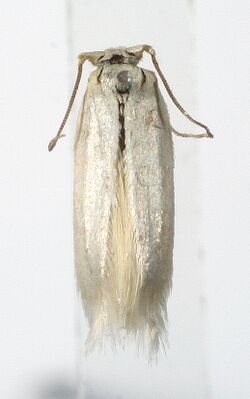Biology:Opostegidae
From HandWiki
Short description: Family of moths
| Opostegidae | |
|---|---|

| |
| Opostega salaciella | |
| Scientific classification | |
| Kingdom: | Animalia |
| Phylum: | Arthropoda |
| Class: | Insecta |
| Order: | Lepidoptera |
| Superfamily: | Nepticuloidea |
| Family: | Opostegidae Meyrick, 1893 |
| Subfamilies and Genera | |
|
Oposteginae
Opostegoidinae
| |
| Diversity[1] | |
| About 7 genera and 214 species by late 2013 | |
Opostegidae or "white eyecap moths" is a family of insects in the order Lepidoptera that is characterised by particularly large eyecaps over the compound eyes (see also Nepticulidae, Bucculatricidae, Lyonetiidae). Opostegidae are most diverse in the New World tropics (83 described species, representing 42% of the world total).
These small, whitish moths are probably miners in plant stems. Examples of host plants used in Europe are Lycopus, Mentha and Rumex,[2] but their biology is poorly known. The subfamily Oposteginae comprises 87 described species and Opostegoidinae includes 15 described species.[3][4]
References
- ↑ Animal biodiversity: An outline of higher-level classification and survey of taxonomic richness - Lepidoptera
- ↑ "HOSTS - a Database of the World's Lepidopteran Hostplants". Natural History Museum. 2007. http://internt.nhm.ac.uk/jdsml/research-curation/projects/hostplants/list.dsml?searchPageURL=browse.dsml&Family=Opostegidae&Genus=&Species=&Country=&sort=Family.
- ↑ Davis D.R. (1989). Generic revision of the Opostegidae, with a synoptic catalog of the world's species (Lepidoptera: Nepticuloidea). Smithsonian Contributions to Zoology, 478: 1–97 online here
- ↑ Davis, D.R. (1999). The Monotrysian Heteroneura. Ch. 6, pp. 65–90 in Kristensen, N.P. (Ed.). Lepidoptera, Moths and Butterflies. Volume 1: Evolution, Systematics, and Biogeography. Handbuch der Zoologie. Eine Naturgeschichte der Stämme des Tierreiches / Handbook of Zoology. A Natural History of the phyla of the Animal Kingdom. Band / Volume IV Arthropoda: Insecta Teilband / Part 35: 491 pp. Walter de Gruyter, Berlin, New York
External links
| Wikimedia Commons has media related to Opostegidae. |
- "Opostegidae". Tree of Life Web Project. 1 January 2003. http://tolweb.org/Opostegidae.
- Higgott, Jeff. "Opostegidae". Jeff Higgott's UK Lepidoptera. http://jeffhiggott.topcities.com/lepidoptera/systematic_list/Opostegidae/opostegidae1.html.
- "Family Opostegidae". Microleps.org. http://www.microleps.org/Guide/Opostegidae/index.html.
- Watson, L., and Dallwitz, M.J. 2003 onwards. British insects: the families of Lepidoptera. Version: 29 December 2011 Detailed description and figures including wing venation.
Wikidata ☰ Q774232 entry
 |
